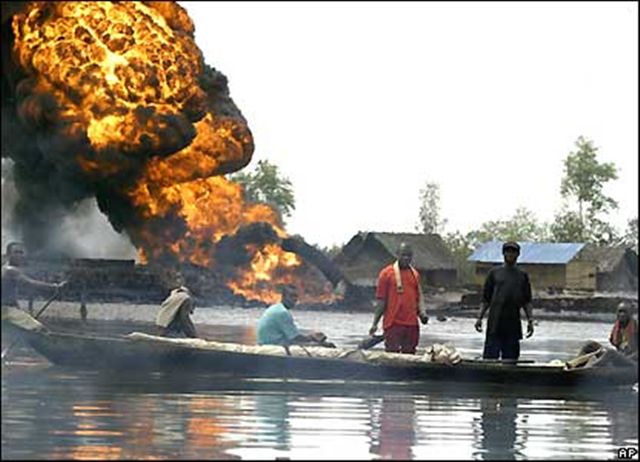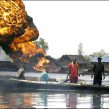
Have the Niger Delta’s MEND Militants Resumed Operations in Southern Nigeria?
Publication: Terrorism Monitor Volume: 10 Issue: 4
By:

Even as Nigeria struggles with a wave of religiously-inspired violence in its northern states, there are now indications that a relatively dormant insurgency in Nigeria’s oil-rich southern states may be restarting in an attempt to take advantage of Nigeria’s precarious security situation. Jomo Gbomo, a purported spokesman for Nigeria’s Movement for the Emancipation of the Niger Delta (MEND), announced in a February 5 email statement that the group had attacked and destroyed an oil trunk line in Bayelsa State in the Niger Delta region the previous day. Gbomo complained that "rather than address serious issues facing the nation and its citizens, [Nigerian President] Goodluck Jonathan squanders public funds on tribalistic sycophants and thugs calling themselves ex-militants." He also threatened more violence in the coming weeks, and confirmed that MEND fighters had also been responsible for an attack a week earlier on the compound of the Minister for Niger Delta in Delta State (Vanguard [Lagos], February 15).
With these attacks, Gbomo formally announced a “new phase” in the group’s struggle, following a lull in violence after a truce was signed in late 2009 between the government and a majority of MEND’s senior commanders, who accepted an amnesty. The operation, if indeed conducted by MEND, would constitute the group’s first confirmed attack since November 2010 (Daily Champion [Lagos], February 10). Meanwhile, the elite Joint Task Force (JTF) assigned to pacify the Delta region has dismissed the threat, avowing that the attack had come from disgruntled militants and criminal gangs unassociated with MEND who were still trying to take advantage of benefits offered by the now-expired amnesty program. The JTF went so far as to publicly identify the seven suspects behind the attacks, insisting that they were unaffiliated with MEND (Vanguard, February 7).
Sporadic attacks continued into 2010 and 2011, albeit at nowhere near the level of violence that pervaded the region prior to the amnesty. In the most significant attack to date since the amnesty, on October 1, 2010, the nation’s Independence Day, alleged MEND militants detonated two car bombs in Abuja outside the justice ministry and a third bomb near a venue where the president was participating in celebrations. The bombings, which killed 12 people, were tied to Henry Okah, an ex-MEND leader who did not accept the amnesty and fell into disfavor with the leadership (This Day [Lagos], October 3, 2010). Alhaji Dokubo-Asari and other amnestied senior MEND leaders condemned the bombing and denied MEND involvement (The Guardian [Lagos], October, 6, 2010).
The ambiguity of MEND’s composition and relation to other similar insurgent groups significantly complicates assessments of its operations, vitality, and the future threat it poses to the nation and to the region as a whole. Dokubo-Asari noted in 2009 that “MEND was created not as an organization but as a name for the purpose of issuing unified statements” (Sahara Reporters [Lagos], January 1, 2009). Often described as an umbrella organization, MEND is a loose web of armed groups that exists in the Delta amongst a number of affiliated, favorable, and even hostile organizations that also operate in the area. Some of these related groups have been known to disobey MEND ceasefires and engage in autonomous activity. Adding to the obscurity, the identity of Jomo Gbomo is also questioned – Gbomo may in fact be a fictitious identity used by several MEND commanders or even possibly Henry Okah himself (Daily Independent [Lagos], November 5, 2010; This Day, October 6, 2010; Vanguard, February 15).
Indicative of its loose structure, MEND has splintered into several factions in recent years and, while nearly all the senior commanders in the field and their respective followers have accepted the amnesty and are observing a ceasefire, some factions have not. Certain of these, claiming to speak for all of MEND, continue to perpetrate infrequent pipeline attacks in the region and issue threats, much to the irritation of MEND’s senior figures (The Nigerian Voice, October 5, 2010; Leadership [Abuja], November 21, 2011). The JTF insists the pipeline attack in early February was perpetrated by one of these separate and insignificant splinter groups (Vanguard, February 7).
Fears would be much allayed if the JTF is correct. At the height of the Delta insurgency prior to the 2009 amnesty, MEND cut Nigeria’s oil output by more than a quarter and production shutdowns from attacks caused an average drop in production of 1 million barrels per day, yielding billions of dollars in losses (This Day, October 8, 2010; Leadership, November 22, 2010). Production levels have increased to previous levels since then and the region has calmed significantly because of the amnesty. Moreover, Nigeria cannot afford a separate security situation in its economically vital south, considering the increasingly deadly activities of Boko Haram in the north and center of the country.
Meanwhile, the northern unrest has also served to unsettle Delta militants. In response to Boko Haram violence, southern insurgents have indicated their willingness, even eagerness, to violently repel the group, with some offering to work with federal security forces to pacify the north (The Nigerian Voice, September 21, 2011). Soon after dozens of southern Christians were slaughtered by Boko Haram outside Abuja on Christmas Day 2011, other Delta militants threatened to attack major oil installations and military bases in the south if the government failed to protect civilians from Boko Haram (Leadership, January 9, 2012). Dukobo-Asari likewise warned that the nation was "on the precipice of a civil war" and that southern Nigerians were poised to take up arms to fight the northern Islamists, but were restraining themselves “only out of respect for the president” (Daily Trust, January 4, 2012).
Leaving north-south hostility aside, it is difficult to envision how MEND would initiate consistent, high-level attacks in the Delta. With former leaders having distanced themselves from militancy and this most recent attack, mobilization of the requisite resources for a sustained and comprehensive movement is rather improbable. Moreover, since 2009, a number of self-described MEND spokesmen have made baseless and bombastic threats similar to the rhetoric issued in the wake of the most recent attack; more often than not, these threats have failed to materialize in action (Daily Champion, September 30, 2011; Vanguard, July 15, 2011; January 21, 2011). Thus, based on recent activity in the Niger Delta, there is little to suggest a revival of the violence to pre-2009 levels in the near future.
On the other hand, while that degree of unrest should not be anticipated, a potential increase in violence is possible, as the roots of violence in the region remain: an excess of instability combined with an abundance of oil. Many worry that the positive results of the amnesty are short-term and the current calm will not last, citing stories of ex-militants who have either returned to fighting in the Delta or have turned to offshore piracy in the Gulf of Guinea (African Confidential, October 21, 2011). At this time, when Boko Haram poses the most significant security concern for the federal government, the activities of MEND and associated Delta insurgents constitute not so much a signal of a return to the violence of pre-amnesty days, but more a reminder that the region remains impoverished, unstable, and dissatisfied – making long-term, sustainable peace an unrealistic expectation. Neither an anomaly nor the harbinger of an apocalyptic trend, the February pipeline attack likely reflects both the continued low-level dissatisfaction in the region as well as the limited capability of marginal gangs to threaten the southern oil industry.
Mark McNamee is an Intelligence Analyst for Sub-Saharan Africa at an international risk consulting firm in the Washington, D.C. region as well as a contract employee for the U.S. Army Combating Terrorism Center. He has an MA in International Relations from Johns Hopkins University (SAIS).





